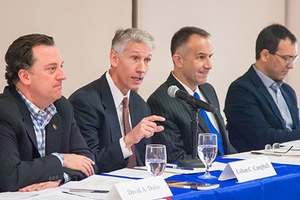Government & Politics
Foreign Lobbying in Congress: A Discussion of Influence and Transparency

A panel of experts spoke about the challenge of tracking foreign lobbyists, recent scandals, and proposed reforms at an event on Jan. 30 sponsored by the AU School of Public Affairs' Center for Congressional and Presidential Studies.
James Thurber, distinguished professor of government, founder, and former director of the center, moderated the discussion, which featured co-editors of his new book, "Congress and Diaspora Politics: The Influence of Ethnic and Foreign Lobbying," to be published by SUNY Press this year.
"The influence of foreign governments on our politics is a hot topic these days," said David Dulio, a co-editor and chair of the Political Science Department at Oakland University. "Before anything came to light about Russian meddling in the 2016 election, there were foreign entities working to influence our politics on all kinds of policies through completely legal means."
Research for the book began with examining how ethnic groups in the United States (e.g., Hispanic Americans, Jewish Americans, and African Americans) work through organizations to impact policies in Congress, said Dulio. However, the scholars decided to include foreign governments and how those interests line up or conflict with their diaspora.
Another co-editor, Colton Campbell, professor and chair of the Department of Security Studies at the National War College, said that while some ambassadors directly lobby members of Congress, foreign governments are increasingly hiring Washington-based lobbying firms to work on their behalf. That makes it difficult to measure their influence because their activities are not reported. Campbell said countries are also forming coalitions around certain issues through congressional member organizations to indirectly persuade lawmakers.
There has long been concern about factions and the influence of foreign entities on American politics, but lobbying is a First Amendment right, said Gregory McCarthy, instructor at the Defense Institute of Security Cooperation Studies and former staffer on the U.S. House Foreign Affairs Committee. He described the vast number of advocacy and identity caucuses in Congress, as well as several instances in which Israeli, Greek, or Cuban interests tried unsuccessfully to advance an issue. "As powerful as these lobbies are sometimes perceived, they don't always win," McCarthy said.
The Foreign Agents Registration Act (FARA) requires disclosure of foreign lobbying, but is rarely complied with, said Eric Lipton, a Washington-based correspondent for The New York Times, at the event.
"I have no issue with lobbying. It is a form of expression, and everyone has right to advocate their arguments," said Lipton. "The problem is the frequent lack of transparency, the deceptiveness of parties involved, and a disregard for the laws of disclosure. In foreign lobbying, the intense abuse of loopholes allows people to hide what they are actually doing."
Thurber said the Russian probe of the 2016 election shed light on problems with the secrecy that shrouds foreign lobbying in Congress. A recent inspector general's report revealed a lack of implementation of FARA - many people who should be registered under FARA are not. Michael Flynn and Paul Manafort are examples of two public figures who failed to register, and their scandals have paved the way for new focus on others. Thurber noted that in the 50 years FARA has existed, there have only been seven violations.
There have been calls in Congress for reform and enforcement of FARA.
"It's time to have more transparency about what's really going on in all these dimensions - not just when they go to the Hill and talk to people, but also their activities with grassroots outfits and their coordination with coalition building among ethnic groups in the United States," said Thurber.

